Recently, terminology, knowledge transfer and the Semantic Web have been more widely researched. We are pleased to announce that a new thesis on these topics has been published on our website: Terminology and the Semantic Web by Carolina Dunaevsky. In the following paragraphs, you will find some information on the content of this thesis.
A summary of the thesis Terminology and the Semantic Web
Terminological practices are facing new challenges with the latest advancements in Artificial Intelligence and in Information Science & Technology. Over the last decade, there has been a shift in the approach to the World Wide Web and the “Web 3.0” was born. This is also called “Semantic Web” and is best-known for its alleged capability of transferring knowledge in ways similar to those employed by humans. Information about a particular domain is saved under “knowledge bases”, which are decentralised repositories that typically have ontological concept systems as underlying models (providing the descriptive metadata of concepts that allow identifying terms and associating them to their corresponding domain knowledge hierarchies).
In this context, today’s challenge is satisfying the need to share knowledge instead of mere data across the globe. It goes without saying that this act of sharing must be done across the web. Thus, the main focus of this thesis is the relationship between terminology (as a science and its practices) and the Semantic Web (SW). Taking terminology as the interface between knowledge and language, this thesis also aims at determining whether the (SW) knowledge models available today meet the requirements of terminologists and norms on terminology.
References
- Dunaevsky, Carolina. 2015. Terminology and the Semantic Web. Master’s of Arts in Terminology and Language Technology, Technical University of Cologne.
Carolina Dunaevsky started her career in the European Institutions as a trainee at the Terminology Coordination Unit (TermCoord) in 2015. After that, she joined the Terminology Coordination Unit of the Court of Justice and contributed to the integration of CuriaTerm into IATE. Additionally, she teaches in the course “Translation and Terminology” of the Master in Learning and Communication in Multilingual and Multicultural Contexts at the University of Luxembourg and collaborates with TermCoord in projects related to ontologies.

